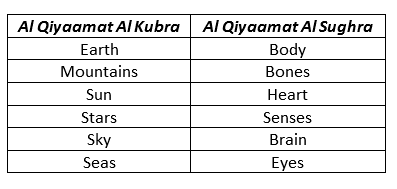Ikseer al 'Arifeen (The Elixir of The Gnostics) - Book Notes
INTRODUCTION
This short article is based on the English translation of the Arabic book Ikseer Al 'Arifeen (The Elixir of the Gnostics). Ikseer Al 'Arifeen is one of the works of the great Muslim scholar and philosopher, Sadr Al Din Muhammad Shirazi (1572 - 1640), commonly known as Mulla Sadra.
The English translation was carried out by William C. Chittick and the book is available as a parallel Arabic-English text.
We feel that it is necessary to highlight a few points as an introduction to what follows:
- This is not a book summary. Rather, it is a selection and presentation of a few of the dozens of points made within the book.
- In some places we have borrowed the exact text from the book (without quotations). In most locations, we have modified the language or added to the text. Also, in some instances we have made slight modifications to the Arabic translation as it was seen fit.
- The points discussed below are not necessarily in the order in which they appear in the book.
- In some places, it is relevant, and important to provide the Arabic terms used in the original text. These terms are mentioned within (parenthesis).
- For brevity and simplicity, the Arabic of Quranic verses and narrations has been omitted. The interested reader may refer to the referenced verses, and/or (in case of narrations) to the text itself where the Arabic is included.
1) On The Origin and The Return
All souls (nufus) originated from Allah, and will return to Him. The final goal of the souls is the return to the origin, but in a perfected manner.
For example:
When a person is hungry, their final goal is satiety of their hunger.
The imaginal existence of satiety is the cause of eating and the true existence of satiety is its goal. We can say that satiety has moved from deficiency to perfection.
2) On The Meaning of Forgiveness and Realization of Allah's Bounty
Allah brings forth the embryo from the tightness and darkness of it's mother's belly into this world and forgives the "sins" that it had committed in its previous stages of existence - i.e. the ugly deeds that it performed as a sperm drop, blood clot, a lump of flesh and an embryo. It was immersed in impurities, nourished by vile fluids, and languished in darkness. But Allah gave it pure milk, sweet to drink [16:66].
Similarly, when man reaches a certain degree of knowledge and faith, and wakes from the sleep of ignorance, God forgives him the sins that have gone before [48:2]. Allah purifies him from the defilement of bodily offenses, and desires of the souls.
3) On The Divine Vicegerency on Earth
One who desires to know Him who governs the cosmos, should first strive to learn about the governance of the soul (nafs) over the human microcosm. The knowledge of the ruler of an empire and how it rules its kingdom can be acquired if we understand how the emperor handles its troops and subordinates.
The army of the soul has nine commanders - And we gave Musa nine signs [17:101]. These include the five physical senses (Hearing, Eyesight, Smell, Taste, Touch) and four internal senses. The internal senses are:
- Conception (Al-Tasawwur)
- Imagination (Al-Takhayyul)
- Intuition (Al-Wahm)
- Intellect (Al-'Aql)
The five physical (external) senses:
- Are lmited to the roles that they have been assigned.
- Are messengers who carry the message but do not understand it.
- Do not carry messages to each other.
- Do not return with a response to the message.
The four internal senses:
- Are free in their actions and versatile in their workmanship.
- Inform of reports, understand them and return with the response - The intellect which is the last (in the chain of command) is the listener, responder, speaker, and ruler.
- Work with each other and conclude as a whole - An individual reflects, conceptualizes, remembers, and is wise.
- Disparity between them is in terms of viewpoints not in terms of a strict separation like the inward senses.
4) On The Effects of Obligatory (Faraaid) and Supererogatory (Nawaafil) works
Allah comes near the servant through obligatory work and the servant goes near Allah through supererogatory works. Allah says:
"The servant never ceases coming near to Me through Supererogatory works until I love him. Then, when I love him, I am the hearing through which he hears," and so on.
5) On Death Being The Minor Resurrection (Al-Qiyaamat-Al-Sughra)
According to a narration from the holy prophet:
"When someone dies, their qiyaamah sets forth"
All the events of the greater qiyaamah have an equivalent in the minor qiyaamah.
With regards to this:
When your body is destroyed through death then your earth will have been shaken with a mighty shaking [99:1]. When your bones - which are the mountains of your earth decay, [then the earth and mountains will have been lifted up] and crushed with a single blow, [69:14] so your mountains will be scattered like ashes [20:105]. When your heart which is the sun of your world is darkened at the spirit's extraction, then your sun will have been folded up [81:1]. When your senses are nullified, then your stars have become opaque [81:2]. When your brain is split apart, then your sky will have been split open [55:37]. When your eyes burst from the terror of death, then your seas will have been made to burst open [82:3]. When your abilities are dispersed and your troops are scattered, then your wild animals will have been mustered [81:5]. And when your spirit and abilities depart then your earth will have been stretched, and it will cast forth what is in it and become empty [84:3-4].




Comments
Post a Comment